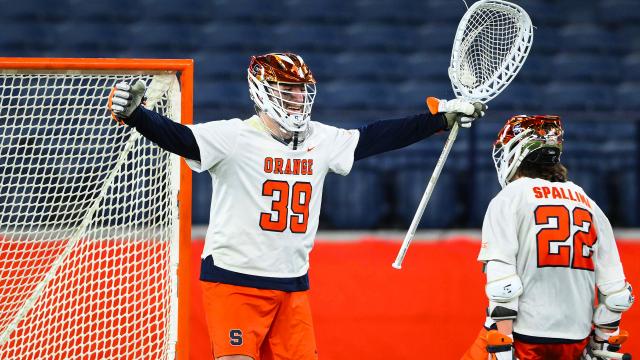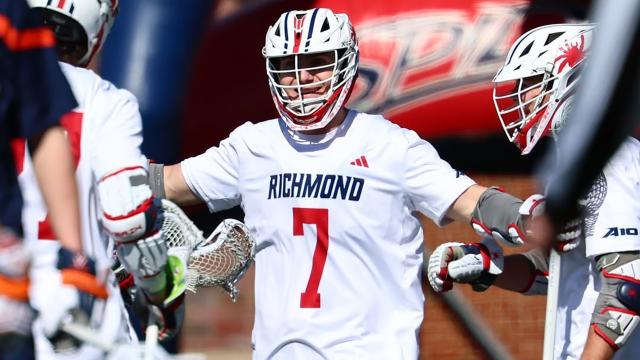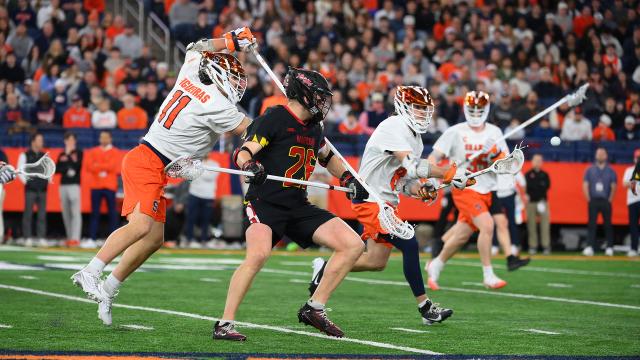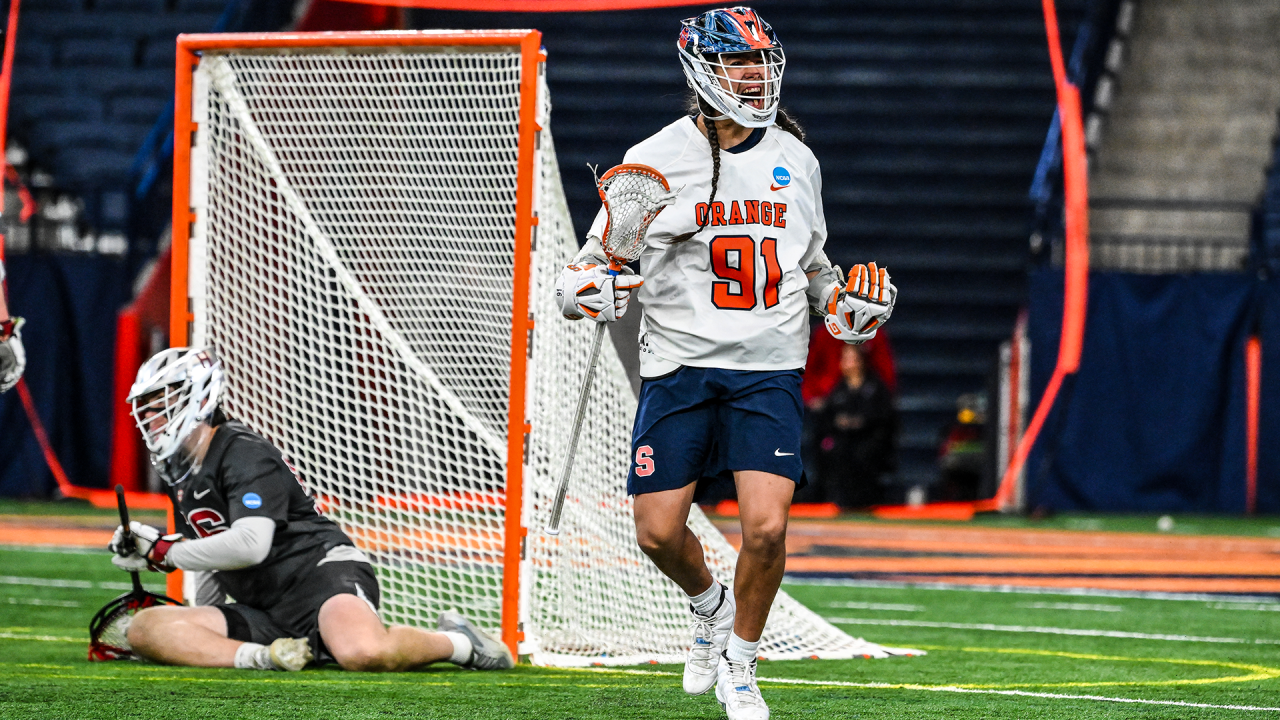
Inside the 99 Seconds That Saved Syracuse's Season
Sam English and his Syracuse teammates will be telling stories of their 13-12 comeback victory against Harvard in Sunday’s NCAA tournament first round game for years to come.
Remarkably, though, the Orange were already talking about it before it even happened.
“Coach O said it to me when it was 11-6,” English said, referring to Syracuse defensive coordinator John Odierna. “He’s like, ‘If we make this a three- or two-goal game, they’re going to get nervous over there because they know they can’t win faceoffs.’”
It was John Mullen who kept winning draws, kept Syracuse’s offense on the field, kept the sixth-seeded Orange (12-5) in position to make the most of a full-time penalty. He was the central cog in the 99 seconds that saved Syracuse’s season, turning what was a frustrating early evening into a frenzy at the Dome and an eventual ticket to a quarterfinal matchup with third-seeded Princeton on Saturday.
Mullen had dominated Harvard once before, winning 28 of 31 faceoffs in a 15-14 loss to the Crimson on Feb. 22. And he was already on his way to another strong day, the latest in a string of them during a sophomore season that saw him take over a starting role after receiving about 35 percent of the workload last year.
Yet Mullen only provided a pathway to success. He was already doing so when Harvard bolted to a 3-0 lead, built it up to 8-2 at the break and still had a five-goal advantage after Jack Speidell scored with 10:59 to go.
“It was definitely one of the most stressful games I’ve ever been a part of,” Mullen said. “Being down 8-2, I had a lot of faith in our team. I didn’t think we were done. We had a lot of belief. That was our thing during halftime.”
Mullen didn’t win one of his 14 ground balls on the ensuing faceoff, but Syracuse wound up with possession anyway courtesy of a loose-ball push. Luke Rhoa rifled a left-handed 13-yarder two shots later to quickly get the margin back to four.
So down 11-7, with 10:28 to go? That still isn’t a comfortable place to be, but things could clear up with a break. One arrived off the ensuing faceoff, when the scramble for initial possession moved beyond the restraining line and attackman Joey Spallina dug in for the ground ball.
“We just had to get one, and we knew Johnny was going to get the ball for us,” Spallina said. “It just so happened that I got decapitated.”
Harvard’s Owen Guest came with a running start as Spallina was leaning over the ball. Officials opted for a one-minute non-releasable penalty; Spallina still thinks it warranted two minutes.
Spallina also took his time getting up, by which point the chase for the loose ball had moved more than five yards away. It also removed any chance of retaliation, though by then Spallina was already thinking about narrowing the deficit.
“If you’d asked me in high school, I probably would have taken a penalty,” Spallina said. “After playing in a bunch of games and playing box where you can legally get punched in the face, you kind of have to just take it. I just took it.”
It was up to Syracuse to take advantage. Already, there were thoughts on the sideline envisioning things narrowing in a hurry.
Already, the Orange could see a surge coming.
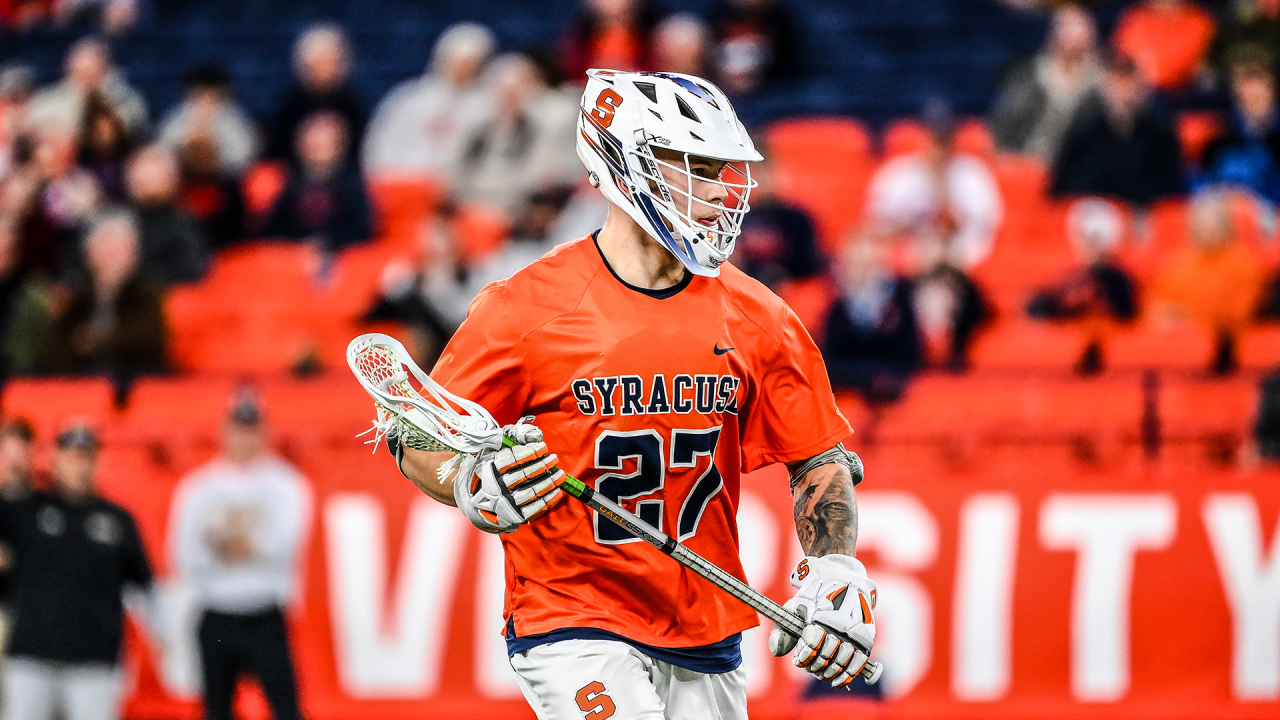
“If we can get a quick goal, we can get two goals on this man up and then we’re going to go on a run,” English said. “[If] it’s 11-9 at the end of this extra-man with 10 minutes left, that’s plenty of time.”
Turns out, English wasn’t greedy enough in his initial forecast. Syracuse required eight passes and just 13 seconds to open the man-up opportunity to score, with Spallina finding Trey Deere with a cross-crease pass to make it 11-8 with exactly 10 minutes left.
Mullen poked the next faceoff forward to English, who sent it along to Spallina and then Finn Thomson. He found long pole Chuck Kuczynski trailing but unaccounted for since the still man-down Crimson didn’t have someone with him on the faceoff wing. Kuczynski slung in a 10-yarder that may have never been more than nine inches off the ground for his first goal of the season at an optimal time, and 9:49 remained.
“I thought, ‘Holy crap, we’re going to score three on this man-up,’” English said. “I remember thinking, ‘What is Harvard thinking right now?’ There’s no way we lose this game, especially with Johnny. He’s different. If we score and keep scoring, he’s going to keep winning faceoffs for us.”
At the moment, Mullen had more immediate problems. Syracuse was enjoying its home-Dome advantage, with the crowd of 5,109 standing and cheering. But there was still a faceoff to win, and a referee bellowing just to be heard.
Was he?
“Barely,” Mullen said. “I really had to be careful about really listening to the ref because he’s like, ‘I have to scream.’ The ground felt rumbly. It was crazy. It’s hard to be calm in that situation, but in my head, we’re coming back and I had a feeling we were going to keep it rolling.”
Syracuse could suddenly afford to be more deliberate, and coach Gary Gait took a timeout after Mullen’s next faceoff win. It wasn’t until just as the penalty finally expired that Owen Hiltz spotted Deere on the crease and connected to pull the Orange within a goal.
So Mullen won the ensuing faceoff — naturally — as English collected the ground ball and passed on to Rhoa, who then casually tossed it back to Thomson. After setting up a play for five seconds, Thomson zipped it back to Rhoa, who had no one on Harvard’s exhausted defense within five yards of him. He stepped down from 13 yards, and Harvard’s five-goal lead was gone in 99 seconds.
It is to Harvard’s credit that things didn’t unravel further from there. Though Mullen won the next faceoff, Hiltz turned it over and the Crimson finally regained possession after three miserable minutes. And it had two possessions with the chance to take the lead before Michael Leo’s man-up goal with 3:32 put Syracuse ahead for the first time.
Mullen claimed yet another draw and it seemed like his day might be complete — until Harvard’s Owen Gaffney’s equalizer with six seconds remaining.
“When the Harvard kid shot that step down, I thought ‘Oh, this might not be good,’” Mullen said. “It obviously went in, but I had faith in our team.”
That went both ways, and understandably so. Mullen is at 65.2 percent for the season, third in Division I and the best among players on a postseason team. Syracuse has scored 87 goals right after Mullen’s faceoff wins, or a little more than five a game.
The latter number is revealing, because it would be nearly impossible to do that without a massive workload. Mullen has won 258 faceoffs this season, second in school history and just 16 behind Bill Dirrigl’s 1988 school record. He’s taken 396 attempts, also the second all-time for the Orange; Jakob Phaup holds the record with 420 in 2022.
It wasn’t that teammates thought Mullen would give them possession. It’s that they knew he would.
“He’s just an animal,” English said. “It’s on to the next faceoff no matter what. He’s never thinking about the previous faceoff. He’s always in the present. He’s always locked in. He’s always ready to go. There’s so much faith in him that when you go out there, he’s going to pick up that ground ball.”
There was even some thought Mullen might just take care of things in regulation. Six seconds is enough to win a faceoff cleanly and run down and score a goal.
It didn’t work quite that cleanly; Syracuse won the faceoff but couldn’t get a shot off in time. But Mullen collected the overtime faceoff to improve to 24-of-28 on the day and 16-of-17 after halftime, sweeping it to English who then got Orange unto the offensive end.
Spallina eventually found Hiltz in a seam slipping between two defenders, and Hiltz got a clean look inside five yards to win it 51 seconds into the extra period.
“Them tying the game up that late after we scored [six] straight in the fourth, obviously it’s going to be a little deflating,” Spallina said. “We knew we were going to start with the ball in overtime. In the back of my mind, I knew we were going to score. I just knew Johnny was going to get the ball and we were going to be OK.”
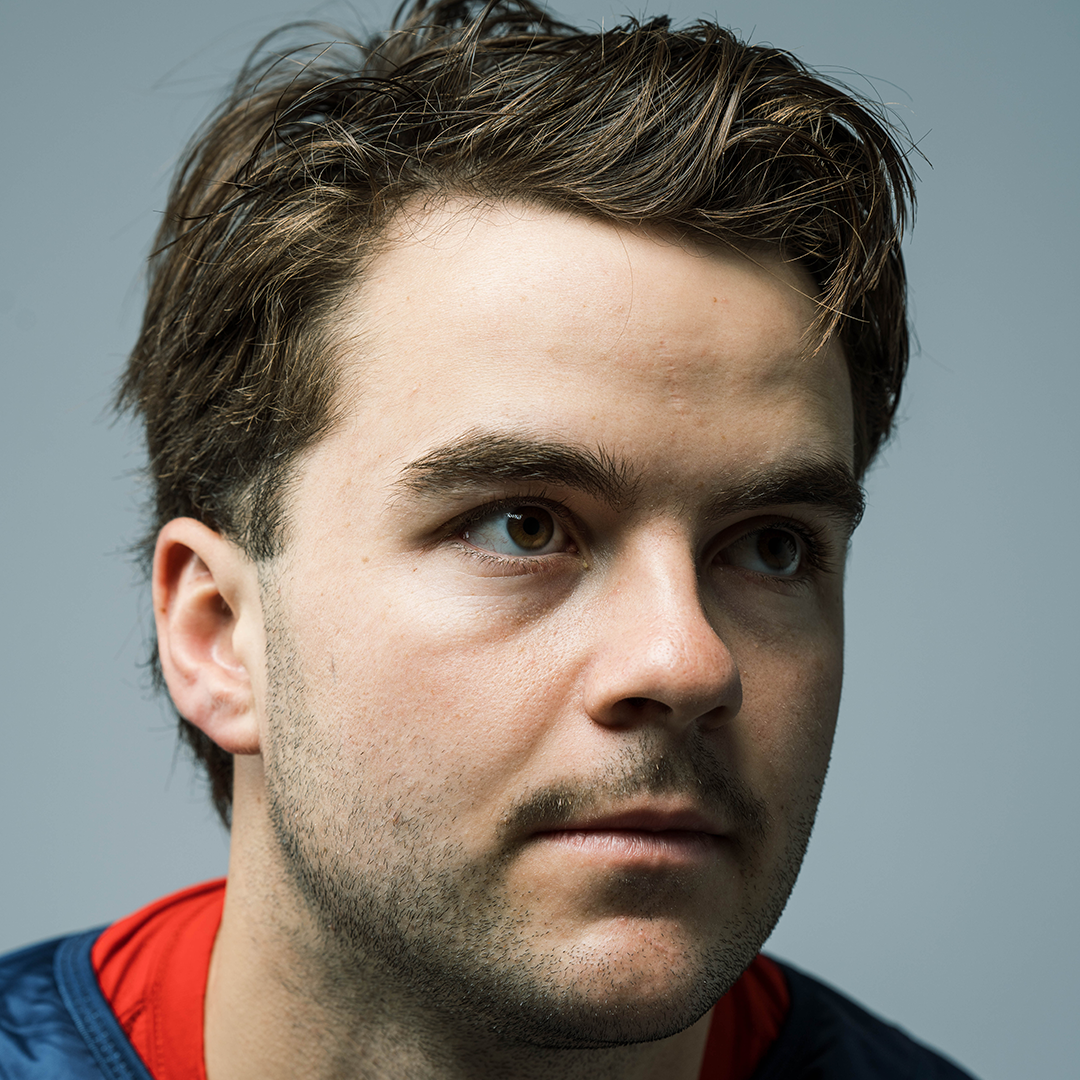
Playing box where you can legally get punched in the face, you kind of have to just take it. I just took it.
Joey Spallina on the hit he took leading to a full-time one-minute man-up for Syracuse
In a sense, it was a classic Syracuse sequence. For years — especially the 22 in a row from 1983 to 2004 when the Orange made the NCAA semifinals every May — playing Syracuse in the postseason was like navigating every act of a horror movie. It was an implacable foe, impossible to shake. Nothing, short of all zeroes on the clock, could finish off the Orange. Even then, opponents had to exhale.
That version of Syracuse was absent from May for a long while. The Orange were a pedestrian 8-12 in NCAA tournament games from 2010 to 2024. In that same span, they were 2-5 in one-goal games. Syracuse hadn’t won a postseason overtime contest since the 2009 national title game against Cornell, a game that required the Orange to erase a three-goal deficit in the final 3:37 of regulation.
“That mindset kind of sunk in when I saw Matt Abbott after the game and he goes, ‘That reminded me of ’09,’” Spallina said. “That really made me think of how crazy that game was. Since the first day I’ve gotten here, I’ve talked a lot about bringing Syracuse back to the way Syracuse is supposed to be. It’s playing hard, it’s scoring goals and defending the Dome.”
There will be no more Dome defense this spring. Syracuse heads to Hofstra’s Shuart Stadium on Saturday. If it beats Princeton, it’s off to Foxborough, less than 35 miles from Mullen’s hometown of Norwell, Mass.
But Sunday’s comeback is something Syracuse can take with it, along with a faceoff man who demonstrated against Harvard why he’s one of the sport’s most dangerous players.
“That’s not the way you want to win all your games, and being down six goals in the third quarter is not the best feeling in the world,” English said. “It does make for some chaos, but it puts things into perspective that everybody is good, everybody is going to give us a game, we can win in any single way, and no matter what the score is, no matter what this game looks like, we have a chance to win the game. That’s what that game gave us.”
Patrick Stevens
Patrick Stevens has covered college sports for 25 years. His work also appears in The Washington Post, Blue Ribbon College Basketball Yearbook and other outlets. He's provided coverage of Division I men's lacrosse to USA Lacrosse Magazine since 2010.

Related Articles
